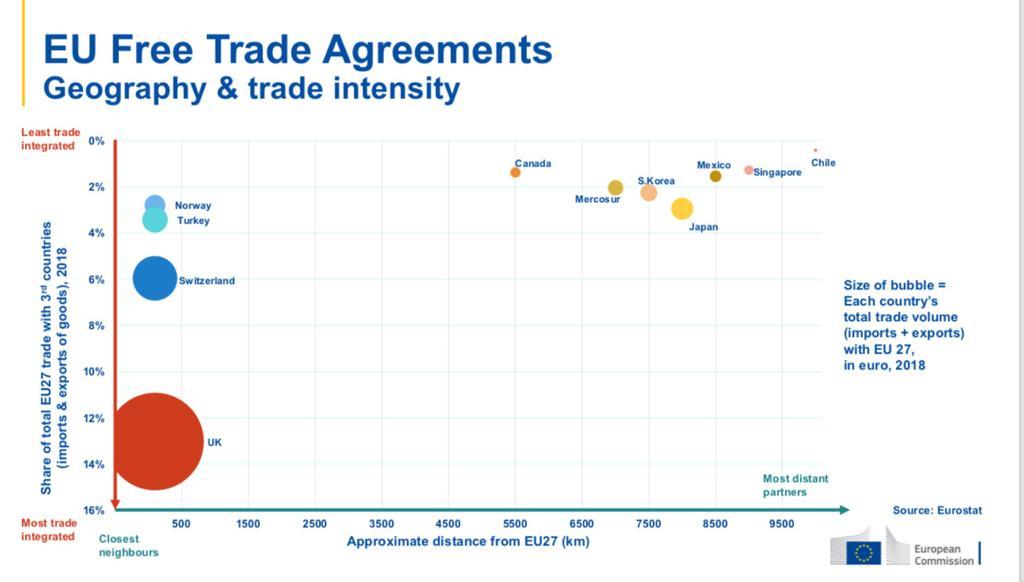EU wages ‘slide wars’ against UK to convince Boris Johnson it will not back down in trade deal row
Brussels hits back after misleading No 10 claim about the ‘Canada-style’ agreement on offer – as relations deteriorate
Your support helps us to tell the story
From reproductive rights to climate change to Big Tech, The Independent is on the ground when the story is developing. Whether it's investigating the financials of Elon Musk's pro-Trump PAC or producing our latest documentary, 'The A Word', which shines a light on the American women fighting for reproductive rights, we know how important it is to parse out the facts from the messaging.
At such a critical moment in US history, we need reporters on the ground. Your donation allows us to keep sending journalists to speak to both sides of the story.
The Independent is trusted by Americans across the entire political spectrum. And unlike many other quality news outlets, we choose not to lock Americans out of our reporting and analysis with paywalls. We believe quality journalism should be available to everyone, paid for by those who can afford it.
Your support makes all the difference.The EU is waging “slide wars” against the UK to convince Boris Johnson it will refuse a tariff-free trade deal if he insists on the right to break its rules.
A graph sets out why the UK – a powerful economy on its doorstep – will not be allowed to wriggle out of past commitments not required of Canada, South Korea, Japan and other distant countries.
It shows how about 13 per cent of EU trade is with the UK, while just 2 per cent or less is with countries many thousands of kilometres away that enjoy favourable agreements with Brussels.
What was dubbed “slide wars” is a riposte to the inflammatory speech by David Frost, the prime minister’s EU adviser, insisting democracy will “snap” unless the UK can set its own regulations.
The stance puts the UK on course to crash out of the transition period at the end of 2020 with no trade deal – risking huge economic damage – unless one side gives ground.

An aide to Michel Barnier, Brussels’ chief negotiator, again insisted it would not budge from maintaining a “level playing field” on state subsidies, environmental protections and workers’ rights.
“It’s clear that for us it’s a different ball game that we are playing with the UK to the one that we agreed with Canada in terms of the level playing field,” Stefaan De Rynck warned, speaking in London.
“Some in the UK now seem to want to become Canadians, but Dover is much closer to Calais than Ottawa is. Proximity matters, distance matters in trade. What also matters is the interconnectedness between our economies.
“So, in terms of zero-tariff, zero-quota access, this brings a lot of benefits to the UK economy and with benefits come obligations.”
The EU hit back after No 10 issued what was widely seen as a misleading claim about a 2017 EU slide, warning Theresa May she was heading towards a hard Brexit, Canada-style deal she opposed.
“Now they say it’s not on offer after all,” tweeted the official Downing Street account, asking Mr Barnier: “What’s changed?”
Even Gavin Barwell, Ms May’s former chief of staff, backed the EU, saying: “Nothing has changed. The EU has always said an FTA [free trade agreement] with the UK would need greater level playing field provisions.”
He pointed to paragraph 77 of the political declaration, signed by Mr Johnson last autumn, which pledged to “uphold the common high standards” for state aid and regulation.
The clash came as the EU further toughened its conditions for a tariff-free deal, on both regulatory alignment and access to UK fishing waters.
A draft mandate discussed by EU ambassadors says any agreement must “stand the test of time”, suggesting Brussels will push for the UK to sign up to its future regulations.
It also makes clear a deal should “uphold” EU fishermen’s current rights in UK waters – a problem for the UK government, which has promised to reclaim fishing rights.

Join our commenting forum
Join thought-provoking conversations, follow other Independent readers and see their replies
Comments